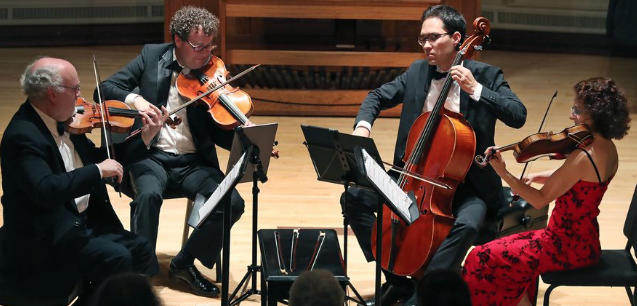
Boston Globe music critic Zoe Madonna reviews Aston Magna’s opening night concert at Brandeis University’s Slosberg Music Center. Some highlights:
“With first violinist Stepner and second violinist Julie Leven’s agitated flights above the robust supports of violist Jason Fisher and cellist Jacques Lee Woods, the sound took on new dimensions.”
“Leven effortlessly pivoted back and forth between cozying up to Stepner’s line and joining the lower strings’ strong chordal figures, adding a soloistic glimmer on occasion.
Read the full review here, or below.
Aston Magna Festival Explores the Roots of the String Quartet
July 1, 2019
By Zoe Madonna
WALTHAM — Haydn is often spoken of as the “father of the string quartet,” a snappy moniker but an erroneous one. While influential, Haydn was far from the first to trot out two violins, a viola, and a low-stringed instrument. To begin this year’s Aston Magna Music Festival, the country’s longest-running annual summer festival of music played on period instruments, artistic director Daniel Stepner led a deep dive into the roots of the genre. At the Slosberg Music Center at Brandeis University, where Stepner is a professor emeritus, a thoughtful concert Thursday traced the genesis and germination of the string quartet, beginning in the early 17th century and concluding with Haydn in full bloom. It started off with some stumbles, but finished wonderfully.
Assembling the program required some creative thinking; the first few pieces were not written with specific instrumentation. In those first selections, the quartet of players held the music by the edges. Intonation was shaggy throughout a sonata by Dario Castello, and the sound felt two-dimensional. Likewise, I wanted to hear more of the dance in Purcell’s “Chacony.”
Then, in the romping final movement of Telemann’s Quartet in A Major, the players seemed to throw all self-consciousness to the wind, with rewarding results. With first violinist Stepner and second violinist Julie Leven’s agitated flights above the robust supports of violist Jason Fisher and cellist Jacques Lee Woods, the sound took on new dimensions. While never note-perfect, there was plenty of heart. The players swapped out their baroque bows for early classical bows in a string quartet by Franz Xaver Richter, and it was easy to hear the first hints of the form that would soon become the prevailing style.
The second half offered more familiar fare, Mozart sandwiched between early and late Haydn. In the first Haydn selection — three movements of a Divertimento in E flat — Stepner spun out a stirring solo in the slow second movement. Leven effortlessly pivoted back and forth between cozying up to Stepner’s line and joining the lower strings’ strong chordal figures, adding a soloistic glimmer on occasion. The minuet of Mozart’s Quartet in G Major (K. 156) had all the toe-tapping bounce that the “Chacony” lacked, and the impish flourishes and locked-in unity of the final Haydn quartet (“The Horseman,” Op. 74, No. 3) delivered the wild ride its title promised.
THE BIRTH OF THE STRING QUARTET
Presented by the Aston Magna Music Festival. At Slosberg Music Center, Brandeis University, Waltham. Repeats July 5 in Hudson, N.Y., and July 6 in Great Barrington. 413-528-3595, www.astonmagna.org
Zoë Madonna can be reached at zoe.madonna@globe.com. Follow her on Twitter @knitandlisten. Madonna’s work is supported by the Rubin Institute for Music Criticism, San Francisco Conservatory of Music, and Ann and Gordon Getty Foundation.

